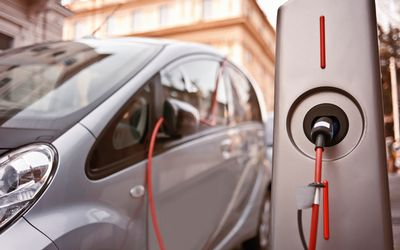The new standard in making cars: innovating sustainability
by Larry Khumalo,
2013-10-21 11:02:15.0
ONCE upon a time, before the great recession, innovation was a value embraced by brands prepared to push the envelope and take risks. The old adage that greater risks mean greater returns was gospel.
But at that time, market forces spared the ordinary brands that played it safe, because innovation was a "nice to have". This has changed. Present-day business processes dictate that innovation has to be central to all brand development for businesses to succeed.
Innovation now frames the way of thinking, the production process, sales and marketing and monitoring and evaluation for any intelligent brand. From strategy and implementation to feedback and right back to strategy, innovation is now a prerequisite for success. But what does this mean for the automotive industry?
Environmental branding
The global conversation over the past three decades has increasingly included environmental sustainability. This has gained momentum in the past decade as consumers adopt environmentally conscious lifestyles. Brands have had to keep abreast, changing not only their products and services but also their internal environment.
In the wake of this consciousness, the automotive industry has come to the party. As a sector that contributes to carbon emissions, its responsibility to offset such emissions is huge. For automotive brands, the idea of addressing this responsibility began as an innovative measure to differentiate themselves and show technological prowess.
Now, as innovation is a prerequisite for successful businesses and the conversation on environmental sustainability is a global issue, innovating sustainability has become a new standard for the automotive industry.
Automotive industry goes green
Engine technology has been central to the transformation of the automotive industry. Brands are spending more resources on research and development in this regard. Although the electric car became the flagship "green" car, the rise of the hybrid has been unparalleled, winning favour with consumers and businesses in developed markets. In the past few years, more car makers have introduced electric cars to the market, bringing with them issues of public charging facilities and electricity consumption.
The hybrid engine, however, took the world by storm, with Toyota being the most reputable hybrid car maker worldwide, thanks to the Prius. The attention paid to engine technology now resides with the marriage of internal combustion and battery technology, focusing on fuel economy, longevity and decreased emissions.
Environmental consciousness gains traction
The evolution of the automotive industry to incorporate environmental consciousness has attracted other stakeholders. Joining the discussion are governments that look to enforce energy and environmental policies.
In 2011, 13 automotive brands, including Jaguar/Land Rover, Hyundai, Nissan and Honda, committed to the US government to improve fuel economy and design engines with better fuel efficiency of up to 23.17km a litre. In economic terms, that would mean a decrease in oil consumption in the US of up to "2.2-million barrels of oil per day", according to Nasdaq.
In 2009, the Japanese government introduced subsidies to incentivise the purchase of fuel-efficient vehicles and assist an economy where demand for "green" vehicles was dwindling. The subsidies also apply to trade-ins of old cars for more fuel-efficient vehicles.
With developing countries such as Argentina, India, Kenya and, recently, South Africa having hosted United Nations climate-change conferences, sustainability is growing in developing countries too. In South Africa, a total of 204 hybrid vehicles were sold in 2006, 627 in 2011 and 410 in the first half of 2012.
South Africa’s Department of Trade and Industry has said local car manufacturing plants that produce more than 5,000 electric cars will be incentivised. A reimbursement of 35% of production costs will be paid to those brands by the government over three years. This should spur car makers to continue exploring fuel efficiency and manufacture more electric cars.
Government intervention is expected to continue in this sector in order to ensure the growth in production of environmentally sustainable vehicles.
"Green" is not a buzzword for the automotive industry any more, but a standard to which all must adhere. Once a trend, sustainability has now become an integral part of the standards that define the automotive industry.
That’s the thing with trends — their staying power gets ingrained in industries and contributes to their very being. So brands that continue to bury their heads in the sand, hoping "green" is a passing phase, will sadly emerge to realise that they have lost market share, or worse, become obsolete.
• Reprinted with permission from the author. Previously published in BizCommunity.

Picture: THINKSTOCK
ONCE upon a time, before the great recession, innovation was a value embraced by brands prepared to push the envelope and take risks. The old adage that greater risks mean greater returns was gospel.
But at that time, market forces spared the ordinary brands that played it safe, because innovation was a "nice to have". This has changed. Present-day business processes dictate that innovation has to be central to all brand development for businesses to succeed.
Innovation now frames the way of thinking, the production process, sales and marketing and monitoring and evaluation for any intelligent brand. From strategy and implementation to feedback and right back to strategy, innovation is now a prerequisite for success. But what does this mean for the automotive industry?
Environmental branding
The global conversation over the past three decades has increasingly included environmental sustainability. This has gained momentum in the past decade as consumers adopt environmentally conscious lifestyles. Brands have had to keep abreast, changing not only their products and services but also their internal environment.
In the wake of this consciousness, the automotive industry has come to the party. As a sector that contributes to carbon emissions, its responsibility to offset such emissions is huge. For automotive brands, the idea of addressing this responsibility began as an innovative measure to differentiate themselves and show technological prowess.
Now, as innovation is a prerequisite for successful businesses and the conversation on environmental sustainability is a global issue, innovating sustainability has become a new standard for the automotive industry.
Automotive industry goes green
Engine technology has been central to the transformation of the automotive industry. Brands are spending more resources on research and development in this regard. Although the electric car became the flagship "green" car, the rise of the hybrid has been unparalleled, winning favour with consumers and businesses in developed markets. In the past few years, more car makers have introduced electric cars to the market, bringing with them issues of public charging facilities and electricity consumption.
The hybrid engine, however, took the world by storm, with Toyota being the most reputable hybrid car maker worldwide, thanks to the Prius. The attention paid to engine technology now resides with the marriage of internal combustion and battery technology, focusing on fuel economy, longevity and decreased emissions.
Environmental consciousness gains traction
The evolution of the automotive industry to incorporate environmental consciousness has attracted other stakeholders. Joining the discussion are governments that look to enforce energy and environmental policies.
In 2011, 13 automotive brands, including Jaguar/Land Rover, Hyundai, Nissan and Honda, committed to the US government to improve fuel economy and design engines with better fuel efficiency of up to 23.17km a litre. In economic terms, that would mean a decrease in oil consumption in the US of up to "2.2-million barrels of oil per day", according to Nasdaq.
In 2009, the Japanese government introduced subsidies to incentivise the purchase of fuel-efficient vehicles and assist an economy where demand for "green" vehicles was dwindling. The subsidies also apply to trade-ins of old cars for more fuel-efficient vehicles.
With developing countries such as Argentina, India, Kenya and, recently, South Africa having hosted United Nations climate-change conferences, sustainability is growing in developing countries too. In South Africa, a total of 204 hybrid vehicles were sold in 2006, 627 in 2011 and 410 in the first half of 2012.
South Africa’s Department of Trade and Industry has said local car manufacturing plants that produce more than 5,000 electric cars will be incentivised. A reimbursement of 35% of production costs will be paid to those brands by the government over three years. This should spur car makers to continue exploring fuel efficiency and manufacture more electric cars.
Government intervention is expected to continue in this sector in order to ensure the growth in production of environmentally sustainable vehicles.
"Green" is not a buzzword for the automotive industry any more, but a standard to which all must adhere. Once a trend, sustainability has now become an integral part of the standards that define the automotive industry.
That’s the thing with trends — their staying power gets ingrained in industries and contributes to their very being. So brands that continue to bury their heads in the sand, hoping "green" is a passing phase, will sadly emerge to realise that they have lost market share, or worse, become obsolete.
• Reprinted with permission from the author. Previously published in BizCommunity.





















Change: -1.37%
Change: -1.62%
Change: -1.58%
Change: -1.59%
Change: -1.23%
Data supplied by Profile Data
Change: -0.39%
Change: -0.40%
Change: -1.37%
Change: 0.00%
Change: -0.40%
Data supplied by Profile Data
Change: 0.77%
Change: -0.15%
Change: 0.89%
Change: 1.33%
Change: 1.52%
Data supplied by Profile Data
Change: 0.99%
Change: 1.12%
Change: 0.69%
Change: 0.50%
Change: -0.68%
Data supplied by Profile Data